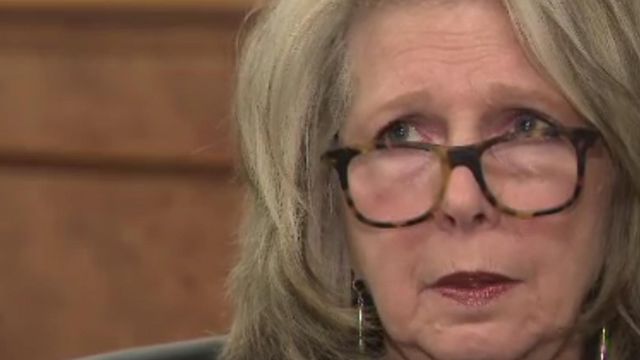NC woman's history with domestic violence shows need for resources in rural communities
A western North Carolina woman is speaking out about the domestic violence she says she suffered at the hands of her husband.
Posted — UpdatedKit Gruelle knows exactly how many days she and her husband spent together.
“Three years, three months and 20 days,” said Gruelle, who lives in the Asheville area.
It’s hard to forget every time your husband lays his hands on you.
Most domestic violence victims will have their first experience before they turn 25, according to a study in 2011 by the U.S. Centers for Disease Control and Prevention.
Gruelle was 22 when she became a domestic abuse victim.
“He had a thing about putting his hands around my throat,” she said.
Her husband, William "Jack" Cherry, joined the Marine Corps in the 1970s and fought in the Vietnam War.
Gruelle said Cherry's military training haunted her every day.
“He told me he was trained to hunt people down and kill them,” she said. “If you leave me, I will find you and kill you.”
Gruelle said she felt she was trapped.
She couldn’t find peace of mind anywhere except where she could keep an eye on Jack.
At least she could see him coming after her.
So she attempted suicide by overdosing.
“When I took those pills, I had reached a point that I just couldn’t take it anymore.”
A $300,000 grant from Blue Cross Blue Shield is funding a project to expand domestic violence training and resources to rural counties.
Gruelle and her husband lived in a house in the North Carolina mountains.
Rural settings pose an additional set of challenges for victims who might want to seek help.
“It might be because it’s such a small area and a lot of people know each other so survivors don’t feel comfortable,” said Cassandra Rowe, an administrator with the North Carolina Coalition Against Domestic Violence.
The concern surrounds the idea that the people in smaller communities likely personally know who the abusers are, so victims might be judged.
“An overarching theme is shame and guilt,” Gruelle said. “I don’t want these people or my parents to find out.”
Another problem is health care providers may not be trained to approach domestic violence situations.
“We have to start to think about whether it’s right to tell women to get out because the risk of women getting out and then being killed goes up by 75 percent when they leave,” Gruelle explained.
“We need to understand there are so many ways in which abusive partners gain power and control over their parents,” Rowe explained.
The Blue Cross Blue Shield grant will help Rowe's group create additional training sessions so physicians can not only identify victims, but understand how to connect them to appropriate resources and help keep them safe.
“It’s important to meet survivors where they are and ask them, ‘What do you need right now?’” Rowe said.
Both Rowe and Gruelle agree each domestic violence case is unique and needs to be handled on an individual basis. Which is why the victim’s input is so important.
“The victim is the expert. If she says I can’t leave because if I leave he’s going to hunt me down and kill me, that has to be our North Star,” Gruelle said.
In Gruelle’s case, it wasn’t a person or resources that saved her. It was fate.
“Jack was strong and he was young and he was healthy,” she said. “And then he was dead.”
Three weeks after Gruelle’s suicide attempt, Cherry was killed in an accident at work in the Gulf of Mexico. He was cleaning up oil spills along the ocean when a steel cable snapped and broke several bones in his body and punctured his lung.
Gruelle went down to the funeral home once the body arrived from Louisiana.
“I remember touching his body and still fully expecting he was going to come off the table one more time and grab me by the throat.”
She said coping with domestic violence has been challenging.
One that might have been made easier if someone had known how to help, she said.
• Credits
Copyright 2024 by Capitol Broadcasting Company. All rights reserved. This material may not be published, broadcast, rewritten or redistributed.






